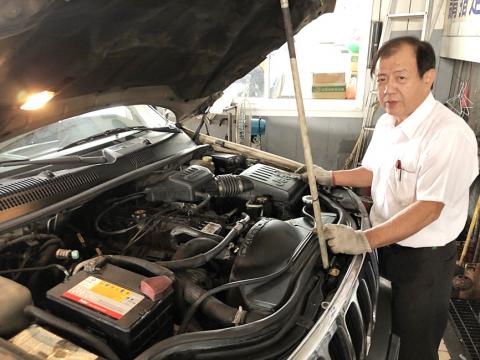As he approaches his 60th birthday on Dec. 31, philanthropist Wu Ching-ho (吳清和) nears the end of his 35-year-pledge to donate one-third of his monthly salary to help poor people and fund the education of disadvantaged children.
Wu made the pledge on Dec. 1, 1982, when he was promoted to factory chief at an automaker.
Born into a farming family, Wu said he moved to the city at the age of 20 to work as an apprentice mechanic.

Photo: Hung Jui-chin, Taipei Times
Many people helped him along the way, Wu said, adding that it was the sense of gratitude for other people’s help that prompted him to make the pledge as a way of giving back to society.
Wu has donated more than NT$6 million (US$199,933) to date.
He did not stop giving away money, whether his monthly salary was NT$25,000, when he first began, or NT$60,000, Wu said.
Asked to tell the most memorable incident from more than 30 years of donating, Wu talked about the reconstruction of Christian Mountain Children’s Home (基督教山地育幼院) — an orphanage in Kaohsiung’s Liouguei District (六龜) — that lacked the funds it needed.
Wu said he donated not only his money, but also his time and energy into the reconstruction.
He said he felt an indescribable sense of peace when he saw that the children had a new home.
He also participated in rescue efforts in the aftermaths of the 921 Earthquake in 1999 and Typhoon Morakot in August 2009.
After the typhoon, Wu said he drove into the mountains each month for a year to carry supplies to the Tavaran community in Pingtung County’s Sandimen Township (三地門), which had suffered serious damage.
Wu on Friday said he is happy that every donation he has made represents his commitment to his promise and his endless desire to help others.
He will end his monthly donations to alleviate some of the pressure on himself, Wu said.
However, he said he would continue to care about disadvantaged people and that his desire to help others will never change.
Those who have benefited from Wu’s philanthropy range from associations to individuals referred to him by his friends, Wu said.
He said that on some occasions he reached out to people in need whom he learned about from news reports.
He also helped children of poor families finish high school, Wu said.
Wu said he did not keep track of the number of students he helped.
These things are not important as long as [I] have actually been able to help,” he added.

WAITING GAME: The US has so far only offered a ‘best rate tariff,’ which officials assume is about 15 percent, the same as Japan, a person familiar with the matter said Taiwan and the US have completed “technical consultations” regarding tariffs and a finalized rate is expected to be released soon, Executive Yuan spokeswoman Michelle Lee (李慧芝) told a news conference yesterday, as a 90-day pause on US President Donald Trump’s “reciprocal” tariffs is set to expire today. The two countries have reached a “certain degree of consensus” on issues such as tariffs, nontariff trade barriers, trade facilitation, supply chain resilience and economic security, Lee said. They also discussed opportunities for cooperation, investment and procurement, she said. A joint statement is still being negotiated and would be released once the US government has made

NEW GEAR: On top of the new Tien Kung IV air defense missiles, the military is expected to place orders for a new combat vehicle next year for delivery in 2028 Mass production of Tien Kung IV (Sky Bow IV) missiles is expected to start next year, with plans to order 122 pods, the Ministry of National Defense’s (MND) latest list of regulated military material showed. The document said that the armed forces would obtain 46 pods of the air defense missiles next year and 76 pods the year after that. The Tien Kung IV is designed to intercept cruise missiles and ballistic missiles to an altitude of 70km, compared with the 60km maximum altitude achieved by the Missile Segment Enhancement variant of PAC-3 systems. A defense source said yesterday that the number of

‘CRUDE’: The potential countermeasure is in response to South Africa renaming Taiwan’s representative offices and the insistence that it move out of Pretoria Taiwan is considering banning exports of semiconductors to South Africa after the latter unilaterally downgraded and changed the names of Taiwan’s two representative offices, the Ministry of Foreign Affairs (MOFA) said yesterday. On Monday last week, the South African Department of International Relations and Cooperation unilaterally released a statement saying that, as of April 1, the Taipei Liaison Offices in Pretoria and Cape Town had been renamed the “Taipei Commercial Office in Johannesburg” and the “Taipei Commercial Office in Cape Town.” Citing UN General Assembly Resolution 2758, it said that South Africa “recognizes the People’s Republic of China (PRC) as the sole

Taiwanese exports to the US are to be subject to a 20 percent tariff starting on Thursday next week, according to an executive order signed by US President Donald Trump yesterday. The 20 percent levy was the same as the tariffs imposed on Vietnam, Sri Lanka and Bangladesh by Trump. It was higher than the tariffs imposed on Japan, South Korea and the EU (15 percent), as well as those on the Philippines (19 percent). A Taiwan official with knowledge of the matter said it is a "phased" tariff rate, and negotiations would continue. "Once negotiations conclude, Taiwan will obtain a better